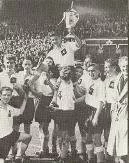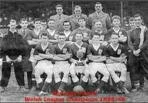
A History Of Football Rules
The history of football rules is essentially the development of football in the northern city of Sheffield and at the ivy towers of Cambridge University.
And, with Sheffield FC celebrating their 150th birthday recently, it’s appropriate to look at how the rules of the game have evolved.
With the first set of uniform football rules having been published in 1848 cynics may suggest that that football hasn’t evolved at all because there is still no-one who can really explain the off-side rule.
Nevertheless, the game and its rules have changed considerably since representatives of the leading public schools met at Cambridge University in 1848 to draft a common set of rules which became known as the Cambridge Rules.
With each school playing to a different set of laws it isn’t surprising that it took an eight hour meeting to hammer out the first accepted set of football rules which were notable for introducing the rule that although any player could catch the ball, they were not allowed to run with it and had to kick the ball away immediately.
Only the goalkeeper could hold the ball and he was also allowed to punch the ball from anywhere in his own half. Goal-kicks, throw-ins and, importantly, forward passes were also introduced for the first time in the history of football rules.
These early rules were subsequently revised in 1856 and included a clarification of the offside rule, “If the ball has passed a player and has come from the direction of his own goal, he may not touch it till the other side have kicked it, unless there are more than three of the other side before him. No player is allowed to loiter between the ball and the adversaries goal.”
This set of Cambridge Rules also included a clause stating that, “In no case is holding a player, pushing with the hands or tripping up allowed.”
In this case the Cambridge Rules differed significantly with those used by Sheffield FC whose playing code devised by Nathaniel Creswick and William Prest allowed charging and pushing with hands.
The Cambridge Rules were further developed in 1863 and adopted by the newly established Football Association. This version of the rules standardised the playing area and, for the first time in the history of football rules, totally outlawed handling the ball by every player except the goalkeeper.
Controversially the rules outlawed hacking, an omission which caused the Blackheath member of the FA to resign in protest. A move which would eventually lead to the formation of the Rugby Football Union.
A proponent of hacking made this heartfelt plea for the tactic to be allowed in football, “(By banning hacking) you will do away with the courage and pluck of the game, and it will be bound to bring over a lot of Frenchmen who would beat you with a weeks practice.” (How about that for a prophecy Russell Grant?).
The Sheffield club and others outside the Football Association refused to adopt these rules and they continued to play to their own code .
This situation continued until 1878 when the FA and the Sheffield club finally agreed on a uniform set of rules although some of the Sheffield laws had already being incorporated into the FA’s rulebook.
Sheffield were responsible for introducing the cross-bar (under previous FA rules a goal was scored as long as the ball passed between the posts regardless of the height of the ball), free-kicks for foul play and, much to the amusement of many at the time, the technique of heading the ball.
Landmark Changes In The History Of Football Rules
1863 Maximum length of pitch 200 yards, goalposts 8 yards apart no crossbar 1870 Eleven a side matches introduced 1872 Tape to be strung between goalposts, no handling rules introduced 1882 Goals needed to have solid crossbar 1891 Referee in sole charge of game on the pitch, umpires became linesmen 1891 Introduction of penalty kicks 1894 Goal nets became compulsory 1912 Goalkeepers restricted to handling ball inside their own goal area 1965 Substitutes permitted |
|
|
Copyright NonLeague Football History 2008
 Delicious
Delicious  Digg
Digg  Facebook
Facebook  Google Bookmarks
Google Bookmarks  Furl
Furl  Stumbleupon
Stumbleupon  Yahoo My Web
Yahoo My Web



